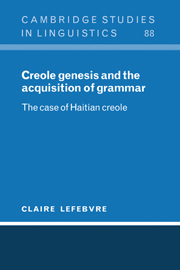Book contents
- Frontmatter
- Contents
- Tables
- Preface
- Abbreviations
- 1 The problem of creole genesis and linguistic theory
- 2 Cognitive processes involved in creole genesis
- 3 The research methodology
- 4 Functional category lexical entries involved in nominal structure
- 5 The preverbal markers encoding relative Tense, Mood and Aspect
- 6 Pronouns
- 7 Functional category lexical entries involved in the structure of the clause
- 8 The determiner and the structure of the clause
- 9 The syntactic properties of verbs
- 10 Are derivational affixes relexified?
- 11 The concatenation of words into compounds
- 12 Parameters
- 13 Evaluation of the hypothesis
- 14 Theoretical consequences
- Appendices
- Notes
- References
- Index of authors
- Index of languages and language families
- Index of subjects
Preface
Published online by Cambridge University Press: 23 November 2009
- Frontmatter
- Contents
- Tables
- Preface
- Abbreviations
- 1 The problem of creole genesis and linguistic theory
- 2 Cognitive processes involved in creole genesis
- 3 The research methodology
- 4 Functional category lexical entries involved in nominal structure
- 5 The preverbal markers encoding relative Tense, Mood and Aspect
- 6 Pronouns
- 7 Functional category lexical entries involved in the structure of the clause
- 8 The determiner and the structure of the clause
- 9 The syntactic properties of verbs
- 10 Are derivational affixes relexified?
- 11 The concatenation of words into compounds
- 12 Parameters
- 13 Evaluation of the hypothesis
- 14 Theoretical consequences
- Appendices
- Notes
- References
- Index of authors
- Index of languages and language families
- Index of subjects
Summary
This book focusses on the cognitive processes involved in creole genesis: relexification, reanalysis, dialect levelling and parameter setting. The role of these processes in creole genesis is documented on the basis of a detailed comparison of Haitian creole with two of its major source languages: French, its main lexifier language, and Fongbe, one of its West African substratum languages. The findings reported on in this book are based on twenty years of research that I have done on the languages involved, alone or in collaboration with colleagues and students, through various projects carried out at the Université du Québec à Montréal.
From 1976 to 1980, with Lynn Drapeau, I conducted a project on popular French (financed by fcar, fir-uqam and olf). In parallel (1975–7), I started a small project on the syntax of Haitian creole (financed by fir-uqam) with some Haitian students and Hilda Koopman, who was then a visiting student in our department, writing an M.A. thesis on Haitian. This project led to the publication with Karoma Press of Syntaxe de l'haïtien (1982), written in collaboration with Hilda Koopman, Hélène Magloire-Holly and Nanie Piou. Building on the results of this project, I began comparing the lexicon and grammar of Haitian creole with the lexicons and grammars of two of its source languages: French and Fongbe. This work was done in the framework of the project Le créole haïtien: langues africaines relexifiées? that I directed together with Jonathan Kaye from 1985 to 1989 (financed by fcar). This project also involved the participation of several students: Anne-Marie Brousseau, Joëlle Brillon, Réjean Canac-Marquis, Rose-Marie Déchaine, Sandra Filipovich and Jean-Robert Cadely.
- Type
- Chapter
- Information
- Creole Genesis and the Acquisition of GrammarThe Case of Haitian Creole, pp. xv - xviiPublisher: Cambridge University PressPrint publication year: 1999

